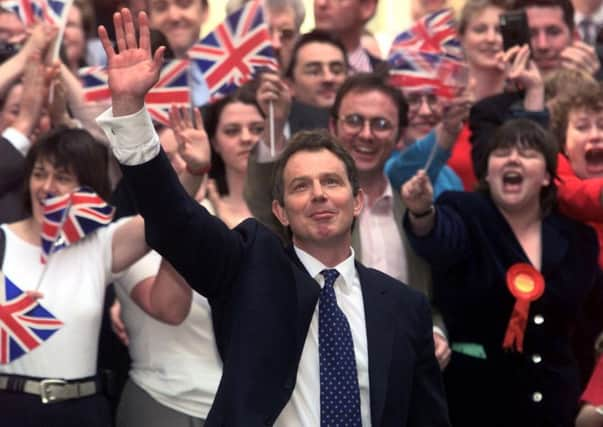Andrew Vine: The striking parallels between Theresa May and Tony Blair's election campaigns


Exactly 20 years ago, on May 2 1997, as Tony Blair’s Labour put the Tories to the sword after 18 years in government, I fell into conversation with Clark outside Conservative Central Office in London’s Smith Square, when we both stepped outside for a breath of air in the early hours as the election results piled in.
It was about 3am, and becoming clear that this was not just a defeat, but a rout.
Advertisement
Hide AdAdvertisement
Hide AdClark had obviously dined well, and was all louche amiability, leaning nonchalantly against a lamp-post as if he hadn’t a care in the world. I asked for his assessment of the emerging picture.
He considered the state of his immaculately-manicured fingernails for a moment, then drawled: “Well, dear boy, you won’t be able to print this,” and delivered a colourfully profane, scandalously defamatory and prophetically accurate tirade about how Tony Blair had buried the Tories for the next decade.
Back inside, the atmosphere of despair and disbelief was proof that a political funeral was under way. Tearful party workers gathered around televisions were speechless with shock as one big beast after another toppled.
Defence Secretary Michael Portillo – whose discomfiture defined the rout – Foreign Secretary Malcolm Rifkind, former Chancellor Norman Lamont, Edwina Currie and David Mellor were among those unceremoniously given the boot by voters.
Advertisement
Hide AdAdvertisement
Hide AdAmid the blood-letting, the election of a promising young Conservative called Theresa May to the new seat of Maidenhead, in Berkshire, went all but unnoticed.
Few in Smith Square were interested in a novice MP when cabinet ministers were going, and the bell tolling on an era that had begun in 1979 when Margaret Thatcher won power.
All that mattered was that the country had decisively told the Conservatives that it wanted rid of them, their paucity of fresh ideas, their sleaze and their endless infighting over Europe.
Instead, voters had put their faith in the 43-year-old Tony Blair to be the youngest Prime Minister of the 20th Century, handing him a thumping, unassailable Commons majority of 179 seats.
Advertisement
Hide AdAdvertisement
Hide AdIt must seem very peculiar to Mr Blair now to be regarded with distaste, and even animosity, by sections of the party he led to such a resounding victory.
But if that night 20 years ago when Labour was so perfectly in accord with vast swathes of the British people feels distant to remaining Blair loyalists, it surely resonates to this day with Mrs May, and not just because it marked a personal milestone of making it to Parliament after two failed attempts.
Though she might not like the comparison, there are striking parallels between her fighting the 2017 general election and Tony Blair fighting that of 1997.
He faced a weak, divided Government that had run out of steam and appeared to have nothing to offer. She faces a weak, divided Opposition lacking detailed policies around which MPs and party workers can rally.
Advertisement
Hide AdAdvertisement
Hide AdHe looked trustworthy and ready to govern instead of an exhausted Prime Minister who plainly could not control his own party. She appears competent and in control, compared to a Labour leader who neither commands the respect nor support of many of his own MPs.
Mr Blair’s lesson of 1997 in appealing to the centre ground beyond Labour’s traditional supporters has not been lost on Mrs May, because it worked so spectacularly well.
She is doing exactly the same. Just as he parked his tanks on the lawns of hitherto safe Conservative seats, so she is taking the battle to Labour heartlands.
And their personal appeal is remarkably similar – both at pains to emphasise an image of hard-working decency, sympathy for those struggling with economic difficulties, and patriotism.
Advertisement
Hide AdAdvertisement
Hide AdThere was a sense in 1997 of change in the air, of the electoral tide running strongly in favour of Labour, even before the polls closed.
So there is again, even at this relatively early stage of the campaign. The change this time is Brexit and the tide is in Mrs May’s favour, with few doubts that she will win the election, the only real question being over how decisively.
Just as Mr Blair’s campaign was micro-managed down to the last detail, so Mrs May’s appears to be, with the least possible room left for error or slip-ups.
There are those Conservative supporters who look at Theresa May through rose-tinted spectacles and see a reincarnation of Mrs Thatcher. They’re wrong. Look again, and the way she is fighting the election brings Mr Blair much more sharply into focus.
Advertisement
Hide AdAdvertisement
Hide AdLike him, she wants to win big and bury the Opposition for a decade. And if in the early hours of June 9 the atmosphere in Labour headquarters mirrors that of Conservative Central Office in 1997, it will be just fine by her.